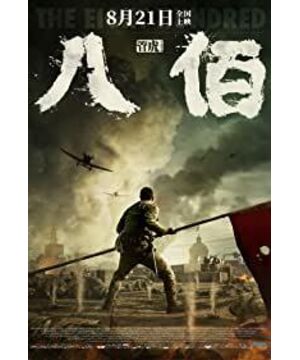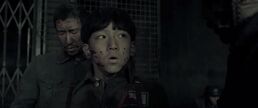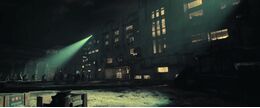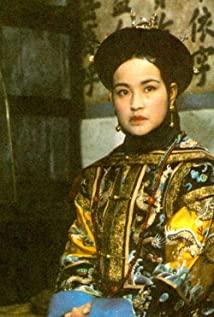No one wants to believe that the follow-up fate of these heroes who are not afraid of life and death will be so tragic...
Due to well-known reasons, the release of "Eight Hundred" can be described as twists and turns.
After a year, the process of watching this movie again is not easy. Perhaps the word "pain" is more appropriate to describe it-pain and shock, but I can't help but want to recommend all my friends to go to the theater to experience it.
Because, it's really worth it.
Here, I would like to share the afterword of watching the movie where I found the broken hand. After understanding the real historical background, I will watch the movie. It will probably be more complicated.
In this movie with a grand scene and a tragic plot, many actors, especially young actors such as Wei Chen, Yu Haoming, and Zheng Kai, dedicated their reborn acting skills, which made the audience forget when they watched the movie. Who, remember only "four lines alone" and their phrase "see you in the next life".
There have been too many film critics who have analyzed the wonderful points of this film, and what I want to share here is the follow-up that was not presented and could not be presented in "Eight Hundred"-in real history, the withdrawal of troops Afterwards, what happened to the head of the regiment, Xie Jinyuan, and the surviving soldiers?
No one wants to believe that the subsequent fate of these heroes who fought for the country and feared life and death would be so tragic.
Speaking of the follow-up, we must first introduce the historical period and the background of the war in which "Eight Hundred" occurred.
1. "Eight Hundred" in history: "We live for China, and we don't want to die"
1. Battle of Songhu
"Eight Hundred" is based on the end of the Battle of Songhu in 1937. It tells the story of a fortified battalion of the 524th Regiment of the 88th Division of the Third War Zone of the Chinese National Revolutionary Army, known as the "Eight Hundred Heroes" in history. .
The Battle of Songhu began on August 13, 1937. Japan called it the "Second Shanghai Incident". It was the first large-scale battle between China and Japan in the Anti-Japanese War, and it was also the largest and largest battle in the entire Sino-Japanese War. The most brutal battle.
The Battle of Songhu began on August 13, 1937. A total of about 1 million troops from China and Japan entered the battle. The battle itself lasted for three months.
The Japanese army invested more than 200,000 people in 8 divisions and 2 brigades, and announced more than 40,000 casualties;
The Chinese military has invested more than 800,000 people in the most elite Central Teaching Corps, 87th and 88th Divisions, 148 divisions and 62 brigades, with 300,000 casualties.
The tragic and tragic battle of Songhu cannot be explained in a few words, but it should be remembered by all Chinese people. It is strongly recommended that you watch the related documentary "Life and Death - Records of the Battle of Songhu in 1937". You can find high-definition film sources on Youku.
2. "Four Lines of Solitude": A Deadly Guard Surrounded by the World
At the end of the Battle of Songhu in 1937, due to the disparity in the strength of the Chinese and Japanese troops, although the national army fought bravely, it was still falling.
At this time, the meeting of the signatory countries of the "Nine-Power Pact" is approaching, and representatives of all countries have gathered in Brussels, the capital of Belgium.
Chiang Kai-shek was full of expectations for this meeting, hoping to show the world China's determination and information in the war of resistance through a "solitary battle", in order to win the world's sympathy and the intervention and mediation of the great powers, so he decided to keep the 88th Division in Zhabei and stick to Shanghai. .
Sun Yuanliang, the commander of the 88th Division, finally dispatched a reinforcement battalion under his command to defend the north of the Suzhou River. They were led by the 524th Regiment attached to Xie Jinyuan. Their position was the four-line warehouse shown in the film.
The 400 soldiers led by the head of the regiment, Xie Jinyuan, were the last Chinese troops standing in the Shanghai area. ".
This team is mostly members of the Hubei Security Regiment - young and lacking combat experience.
With more than 400 people like this, facing the maddened Japanese army, everyone knew in their hearts: If you go here, you will die.
Sixing Warehouse and the concession are separated by a river. They fought alone for four days and five nights, creating a peculiar landscape that has never been seen before in the history of war between China and foreign countries. The Chinese people and British and American journalists in the concession, regardless of stray bullets, watched the other side the whole way. This fierce battle between the Chinese and Japanese armies.
The bravery of the "Four Elements Alone Army" infected everyone who witnessed all this, and changed the international people's view of the Chinese army. Even though the Chinese army suffered heavy casualties, more and more young Chinese asked to join the army.
3. Why did you withdraw your troops after holding on?
The day-to-day war between China and Japan has brought enormous pressure to the public concession on the other side.
In the southeast corner of the Sixing Warehouse, there are two huge gas tanks. Once the Japanese artillery fire deviates and the gas tank is blown up, the safety of the people in the settlement will be affected, and half of Shanghai will not be protected.
The public concession authorities sent a note to the Chinese government through diplomatic channels, requesting the government to order a lonely retreat from a humanitarian standpoint.
Soon, Chiang Kai-shek issued a withdrawal order.
Although it was unacceptable, but the military orders were like mountains, Xie Jinyuan had to take the overall situation into consideration and execute the orders.
This is why at the end of the film, the "Yao Hundred Heroes" braved the intensive firepower of the enemy and rushed across the bridge to withdraw into the public concession under the hail of bullets.
This time, the "Eight Hundred Heroes" fought against tens of thousands of Japanese troops in the small space of the Sixing Warehouse. They fought fiercely for four days and nights, killing more than 200 enemies and injuring countless enemies. They won military, political and moral victories. Xie Jinyuan was rewarded by his superiors and was promoted to colonel head.
2. Follow-up: easy for the dead, hard for the living
1. After the withdrawal of troops, the "Eight Hundred Heroes" were imprisoned in the "solitary camp", and the ending was tragic
After the "Eight Hundred Warriors" withdrew their troops from the Sihang Warehouse, they entered the British concession area. The British army had previously promised to "be responsible for covering the retreat of the lonely army", so that "the lonely army will return from the concession to the west of Shanghai".
However, when the lone army braved the Japanese army's hail of bullets and entered the concession at a price as large as the bloody battle of four days and nights, the British army immediately ordered them to confiscate their weapons.
On the grounds that "soldiers cannot leave their guns", the Lone Army refused to disarm, and the two sides confronted each other. At this time, the Kuomintang government also sent people to persuade the Lone Army to cooperate with the British army - but the Lone Army had just handed over the guns, and the British army escorted the Lone Soldier into a vehicle and sent it to the army. Jiaozhou Road Detention.
The reason why the British army reneged on its promise was because the Japanese army threatened the concession authorities: "If the lone army is allowed to return through the concession, they will enter the concession to pursue the lone army."
——Based on this, the "Eight Hundred Heroes", who were daring and awe-inspiring to the Japanese army like rats, were caught without knowing what to do, and were placed under house arrest for 4 years in the "solitary camp", which was like a prisoner of war camp.
The "solitary camp" was surrounded by barbed wire, guarded by Belarusian soldiers, and living conditions were extremely poor.
In a difficult environment, the head of the regiment, Xie Jinyuan, still strictly urges the lonely army to work hard, and everything is arranged in an orderly manner. Every day, time is arranged according to the three contents of education, production and sports. In addition to subsidizing living expenses, the production income also donated thousands of yuan to support the government's anti-Japanese war funds.
During the period, in order to maintain the dignity of the nation, the lone soldier fought with the Belarusian soldiers with bare hands. More than 100 people were injured, and four people were seriously injured and died soon after.
During the four years of hardship, the head of the group, Xie Jinyuan, wrote a diary of nearly 500,000 words.
He wrote in his diary: "The solitary army camp is almost the same as a 'captive camp' in the concession. Freedom is restricted and life is very hard." However, Xie Jinyuan was still positive and optimistic, strictly governed the army, and insisted on the flag-raising ceremony before the morning exercise every day.
Due to his resolute refusal to lure the Japanese and puppets to surrender many times, Xie Jinyuan was finally assassinated and tragically killed by the traitor Luan Blade bought by Wang Jingwei.
Since then, the famous "Four Lines of Solitude" have been reduced to hard labor by the Japanese army, and most of them have died in foreign countries. 2. Head Xie's widow returned to Shanghai to survive alone
As the wife of the hero Xie Jinyuan, Ling Weicheng is also a courageous and responsible woman.
Xie Jinyuan, courtesy name Zhongmin, is a native of Jiaoling County, Meizhou, Guangdong. He graduated from the fourth phase of the Whampoa Military Academy.
His wife, Ling Weicheng, came from a businessman's family in Xujiahui, Shanghai. She is a graduate of music major. She is all-round in playing, playing and singing, especially good at the violin. She was a veritable new fashion woman in Shanghai at that time.
Xie Jinyuan and Ling Weicheng met at a wedding in 1927, when they were best man and bridesmaid respectively.
Although Ling's mother expressed concern about marrying a soldier during the war, Ling Weicheng fell in love with Xie Jinyuan despite her objections.
In early May 1928, the Northern Expedition was stopped by the Japanese army in Jinan (referred to in history as the "Jinan Massacre").
At this time, Ling Weicheng, his girlfriend whom he met in Shanghai a year ago, went to Wuhan to visit.
In September 1929, the two held a grand Western-style wedding at the Dahua Hotel in Hankou, and the guests gathered.
Due to the war, after marriage, the two of them got together less often, and most of them communicated by correspondence.
In 1936, when the situation of the Anti-Japanese War in Shanghai was tense, Xie Jinyuan decided to let his pregnant wife take her three children to her hometown in Jiaoling, Guangdong in order to fight against Japan with peace of mind. Xie Jinyuan's arrangement at that time was opposed by his wife Ling Weicheng's family.
Ling Weicheng could have gone to Chongqing with the relatives of the senior generals at that time, but in order to make her husband feel at ease in the war, he still obeyed Xie Jinyuan's request and took the children to the hometown where his in-laws were.
A girl from Shanghai who grew up in a wealthy family suddenly dragged her son and daughter to a remote rural area in northern Guangdong. Not only did she have to pick manure and farm the fields herself, she also had to serve her elderly in-laws, raise four children who were waiting to be fed, and stay with Xie Jinyuan's late eldest brother. The young daughter of the next generation - Ling Weicheng had to endure such a life for 10 years.
His son Xie Jimin told the media when he recalled the past:
"According to the Hakka custom, men do not go to the fields to cultivate the land, and the elderly grandfather is indeed unable to bear the farm work, and the mother becomes the only labor force.
The uncle's daughter, Xie Mengzhao, is about the same age as my eldest sister. Because the uncle died and the aunt left, she was left unattended, and her mother treated her as her own. In this way, the grandparents, mother and five children, a family of eight, could not afford to eat. It depends on the mother's farming.
Although my father also sent some money, it was only a drop in the bucket. My mother took off her cheongsam and high heels, took off her jewelry, and replaced it with the coarse clothes of a local peasant woman, and learned to do farm work from scratch.
Under the pressure of life, human potential is endless. She can gradually handle tasks such as sowing and transplanting, watering and fertilizing, cultivating and harvesting. Her mother has transformed from a Shanghai lady who does not touch the ashes to a peasant woman who faces the loess and turns her back to the sky. .
I can't imagine that my mother was a woman who had no worries about food and clothing, and was fond of music and art. In the future, she would sow seeds, pick manure, and fertilize the fields every day. The first half of her life was completely different from the second half of her life, but she survived. "
After finally surviving the victory of the Anti-Japanese War, Ling Weicheng took his 4 children to Shanghai. Due to the lack of money, he walked on the road for two whole months.
After returning to Shanghai, she learned that many of the surviving "Eight Hundred Warriors" were still living on the streets and had no life, so she published a message in the newspaper: "The widow of the anti-Japanese general Xie Jinyuan arrived in Shanghai yesterday and stayed at the Xinxin Hotel. "
The next day, some veterans, news reporters, and socialites who were alone in Shanghai came to the door, making the originally deserted small hotel a crowded market, and nearly a hundred veterans complained about the suffering of being displaced.
Therefore, Ling Weicheng resolutely took up the unfinished responsibility of her deceased husband, ran around, appealed to all sectors of society, and went to Nanjing to ask Song Meiling for help, but there was no response.
His son Xie Jimin recalled:
"In isolation, the mother and the surviving lonely soldiers thought about driving a bus together to maintain their livelihood, and organized an industrial service agency to produce towels, socks, soap, etc., but they all ended in failure.
In desperation, my mother went to the Shanghai government to discuss the case.
As a result, the municipal government pushed it to the social bureau, and the social bureau pushed it to other departments. "
"Later, I read the literature and history materials and learned that the National Government's work at that time was focused on fighting the civil war. Tang Enbo once held a tea party for veterans to mobilize the lonely soldiers to return to the army, and promised that even ordinary soldiers would be assigned the post of platoon leader, but none of these soldiers agreed. Such a "preferential treatment policy"
——I once asked them why they did not accept it, and they said: We have suffered so much in the past eight years, and it is obligatory to fight the Japanese, but we have fought enough, and we do not want to fight the civil war any more. "
"The origin of the lonely troops is mainly Hubei, but also Hunan, Shanxi and other places. In the early 1950s, most of the lonely troops returned to their hometowns one after another. Before leaving, they all came to say goodbye to their mothers, and their mothers always gave them a sum of money as travel expenses and settlement expenses. ."
Even though it was so difficult, Ling Weicheng and his children were still impacted during the WG period.
During this period, Xie Jinyuan's mausoleum was smashed, Ling Weicheng and his children went through many house raids, the eldest son became mentally ill and died of illness in 1970, and a son-in-law was tortured to death...
The fate of the hero's survivors is still like this, and what will happen to the fate of other strong men and their families is really unbearable to think about.
At the end of the article, I highly recommend this documentary about the Battle of Songhu: "Life and Death - Records of the Battle of Songhu in 1937", the third episode has a very detailed video introduction to the "Yao Heroes" who stick to the four-line warehouse.
For students who are interested in the frontal anti-Japanese battlefield, there is a series of books "One Inch of Rivers and Mountains, One Inch of Blood" that is also worth reading.
In the end, I still want to call on everyone to go to the theater and support the twists and turns of the film "Eight Hundred".
It may not be perfect, but the stories and feelings it tells are worth seeing.
After all, no matter how the world changes, history should not be forgotten, let alone heroes.
Source:
1. Documentary: " Life and Death - Records of the War of Resistance in Songhu in 1937 "
2. China Archives Network (Director of the State Archives Administration): "Xie Jinyuan: The Anti-Japanese Hero of "Eight Hundred Heroes Keeping the Four Lines"
3. People's Daily Online: "Anti-Japanese Hero Xie Jinyuan and His "Eight Hundred Heroes"
4. Shanghai Local Chronicle Office - District and County Chronicle: "Liu Xunfu: Xie Jinyuan's Solitary Barracks"
5. Phoenix.com: " Searching for the Descendants of Huangpu: Xie Jinyuan's Tombstone Was Smashed to the Cemetery Fence "
6. Guangdong Provincial Party School of the Communist Party of China: "Unforgettable Footprints: Guangdong Hakka Generals in the War of Resistance"
7. People's Daily Online: " Anti-Japanese War Family Letter: Our Forefathers' Anti-Japanese War Memories "
8. The website of the Ministry of National Defense of the People's Republic of China: " How hard are the bones of Chinese soldiers? Look at the "Eight Hundred Heroes" in the Battle of Songhu "
9. Xinmin Evening News: " Xie Jinyuan Ling Weicheng: Life and Death "
10. Shanghai Archives Information Network: " Mother Ling Weicheng: From Miss Shanghai to Mrs. Xie Jinyuan "
PS:
After this postscript of watching the movie was released, I found that many newly registered accounts made malicious comments - most of them were scolding for scolding, without any basis. At first, it was a bit bizarre, but after thinking about it, it was probably because the school had not started yet~
Welcome to share and discuss normally, malicious replies will be blocked.
Thank you to everyone who persevered in reading this long article.
View more about The Eight Hundred reviews











